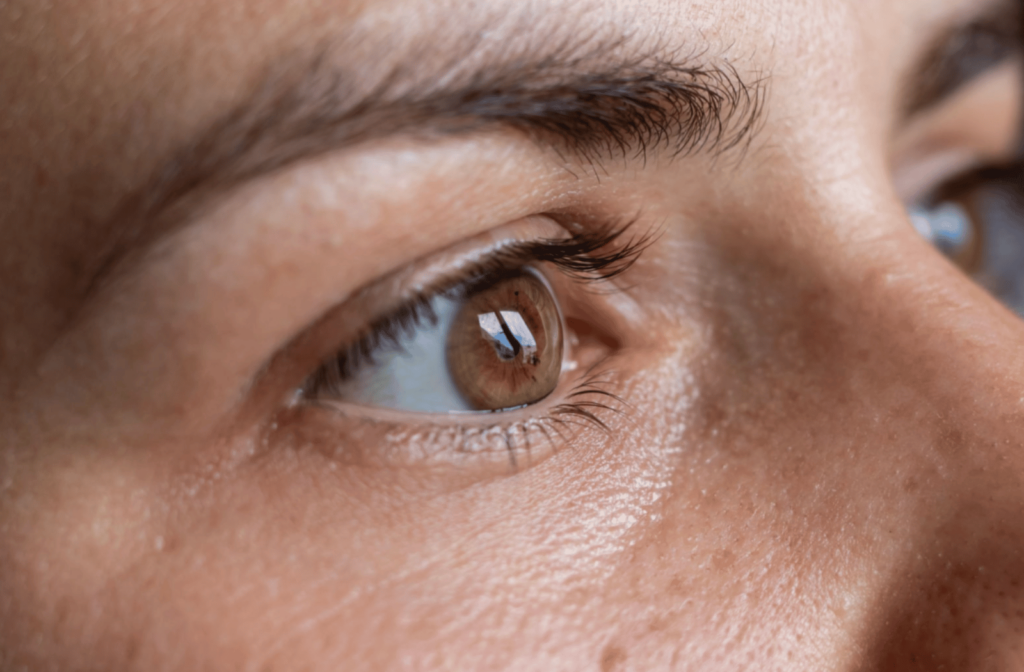Keratoconus is a condition of the eye wherein the cornea, the clear front dome of the eye, gradually thins and bulges outward in a cone shape. This condition may cause visual impairment, and if left untreated, those visual challenges can worsen. You may first notice keratoconus when it affects your vision, but your optometrist may also be able to see the changes before you do during a comprehensive eye exam.
The good news is that several treatment methods are currently available to help control the progression of keratoconus and provide clear vision. Depending on your symptoms, your optometrist may recommend eyeglasses, contact lenses, corneal cross-linking, or a corneal transplant as a keratoconus treatment method.
Symptoms of Keratoconus
Keratoconus can develop between the ages of 10 and 25. The symptoms may be mild initially but can worsen as the condition progresses. Common signs of keratoconus include:
- Blurred or distorted vision
- Light sensitivity
- Eye strain
- Frequent changes in eyeglass or contact lens prescriptions
- Halos or glare around lights
If you’re experiencing any of these symptoms, it’s essential to visit an eye doctor to determine the cause and find appropriate treatments for protecting your vision.
Causes of Keratoconus
Eye doctors are unsure of the exact cause of keratoconus, but some factors may increase your risk of developing it, including:
- Genetics
- Frequent eye rubbing
- Chronic allergies
- Eye injuries
- Down syndrome, Marfan syndrome, and other genetic conditions
Although these factors can increase the likelihood of developing keratoconus, remember that many people with keratoconus have no known risk factors.
Treatment Methods
Corrective Lenses
Contact lenses and glasses may help improve vision when keratoconus is in its early stages. While most people can wear glasses no matter the size or shape of their cornea, you may require a specially designed pair of contact lenses to fit your eyes.
Scleral lenses are a popular choice for people with keratoconus. They are much larger than traditional lenses, sitting on the white sclera while vaulting over the cornea entirely. This vaulting can give just enough space to wear contacts for those with mild to moderate cases of keratoconus.
Ortho-K Lenses
Orthokeratology lenses, or ortho-k lenses, are a type of specialized contact lens designed to reshape the cornea while you sleep. They’re made of gas-permeable material, an important feature to help oxygen reach your eyes.
Ortho-k lenses are designed to work by applying gentle pressure to the cornea, flattening the bulging part. While this is only temporary, when you wake up and take the lenses out, your cornea can retain this shape for a time. This can generally provide clear vision throughout the day, but you’ll need to put the lenses back in at night to start the correction process again.
Ortho-k lenses can be effective for those affected by mild to moderate keratoconus. They won’t reverse or cure keratoconus, but they may provide temporary relief by correcting vision without the need for glasses or surgery.
Corneal Cross-Linking
Corneal cross-linking (CXL) aims to halt the progression of keratoconus and prevent further deterioration. Simply put, CXL involves strengthening the cornea through the use of a specialized UV light and a riboflavin solution applied to the eye’s surface.
The UV light activates the riboflavin solution to help form new links between the cornea’s collagen fibres. These collagen fibres are essentially the cornea’s structure. If successful, the result is often a stronger, more stable cornea that’s better equipped to resist the forces that cause keratoconus.
CXL is performed under local anesthesia and is generally an outpatient procedure. It typically takes between 30 minutes to an hour, depending on your specific needs. After the procedure, most patients can return to their normal daily routines. However, you may be required to wear a protective shield over your eyes for several days.
Studies have shown that CXL is an effective treatment method for keratoconus, with young patients experiencing a 90% chance to slow or halt disease progression.
Corneal Transplant
Not everyone with keratoconus requires a corneal transplant. However, a corneal transplant, or keratoplasty, may be necessary for severe cases where vision is significantly impacted. This surgery involves replacing the affected cornea with healthy tissue from a donor.
Candidates for a corneal transplant include those with the following conditions:
- Progressive vision loss
- Corneal scarring
- Severe cornea bulging
Your eye doctor can thoroughly evaluate your eyes to determine if a corneal transplant is right for you.
Corneal transplant surgery is considered a highly successful treatment method for keratoconus, and it remains one of the most preferred treatment options for keratoconus that has progressed beyond the limits of other treatments.
Finding the Right Treatment for Keratoconus
Keratoconus affects approximately 1 in every 1000 people. While the condition can be serious, several treatment options are available that can help manage it to support your vision and health.
With the right treatment, those living with keratoconus can see a future with clear vision.
From contact lenses to corneal transplants, Toronto Centre Eye Care can help you find the right treatment based on the stage and severity of the keratoconus affecting your eyes. If you want to learn about your options regarding keratoconus treatments, book an appointment with us today.



